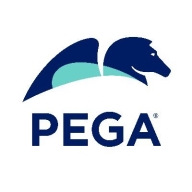

Pega Platform and Appian both compete in the domain of enterprise-level business process management solutions. Based on feature sets and ease of deployment, Appian has a competitive edge due to its rapid development capabilities and adaptability.
Features: Pega Platform is notable for its robust case management, extensive API capabilities, and rapid deployment options which are ideal for large enterprises requiring no-code and cloud solutions. Appian excels in low-code rapid development, process modeling, and workflows that facilitate collaborative applications, offering flexibility and user-friendly design that appeals to a variety of business needs.
Room for Improvement: Pega Platform could reduce its learning curve and address its complex integration issues, along with high pricing concerns. Improvement in UI and technical support is also needed. Appian, while effective, needs enhancements in UI flexibility, offline capabilities, and more advanced automation, along with addressing pricing transparency.
Ease of Deployment and Customer Service: Pega Platform allows flexible deployment across public, private, and hybrid cloud models, though complex issues may lead to support delays. Appian offers versatile cloud and on-premises deployment with effective technical support, though licensing clarity could be improved. Appian's ease and speed in deployment provide an advantage over Pega.
Pricing and ROI: Pega Platform is priced high, often suitable for large enterprises due to its extensive features and significant ROI potential in complex environments. Appian’s licensing is more adaptive, offering cost-effective solutions for quicker ROI via its rapid development and lower initial deployment costs.
Appian is very efficient, allowing us to build a lot of applications within a financial year, making it cost-effective.
Their customer service is responsive, and the team is very prompt for support.
The technical support is generally good.
Appian has a community where I can put my questions.
The technical support from Pega is very low, rating a one or two out of ten.
I never needed support from the platform standpoint, but if additional features are required, we have regular meetings with the product team for feedback.
Pega's technical support team is very helpful.
Appian is scalable, but it depends on how you build your applications.
Initially, without much coding, I can easily handle five thousand records.
It depends on how it has been designed and how it has been configured.
I would like to see more enhancement in the user interface to allow more freedom in designing the sites and pages.
If there is a very complex process that includes a lot of data transitioning and memory-centric processes, it consumes a lot of memory.
Pega introduced Constellation, which allows a user to build a more engaging visual experience.
My learning curve in robotics has been challenging.
On the pricier side, both Appian and Pega are enterprise-level solutions, placing them on the slightly higher side.
The pricing of Appian is based on the number of users and generally ranges from 70 to 100 USD per user per month.
The pricing is expensive, and this is an issue.
Pega is priced higher than open-source options like Flowable but is suitable for large-scale industries like banking and insurance.
The zero-code integration feature is remarkable, allowing for ease of data transfer and workflow enhancement.
It is easy for me to define the process and create configurable workflows.
I can create tables, perform database-related activities, and create multiple tables.
Management capabilities such as dashboards.
Pega Platform is excellent for enterprise-level solutions with integrations to entire systems, including case management, service orchestration, CRM, decision-making capabilities, digital process automation, and AI-driven functionalities.


Appian is a unified low-code platform and solution used by businesses to build enterprise applications and workflows. This product adapts to the needs of clients and the technologies they are already using to combine their data in a single workflow and maximize resources. The platform has four main components through which it transforms the work process for companies of various sizes. They are:
Appian is utilized across a diverse set of industries, including automotive and manufacturing, energy and utilities, education, financial services, telecom and media, transportation, retail, insurance, healthcare, and life sciences. The most frequent use cases of Appian are customer journey, governance, risk and compliance, operational efficiency, supply chain, distributed order management, and environmental, social, and governance (ESG) management.
Appian Features
Appian has various features that allow users to create solutions for their businesses. These features can be separated into a few groups according to function, including automation, low-code application development, and integrations and data. Some of the most frequently used features of Appian include:
Appian Benefits
The benefits of using Appian include:
Reviews from Real Users
A practice leader - digital process automation at a computer software company values Appian highly because the product is easy to develop, low-code, and has a good user interface.
Alan G., an advisory board member at Codecon VR, Appian offers a clear application life cycle, easy to learn documentation, and comes with a fundamentals course.
Pega Platform facilitates business process management, case management, and workflow automation for industries like banking, insurance, and healthcare. It supports digital transformation and customer service enhancements with its low-code capabilities and seamless integrations.
Pega Platform enables users to create efficient systems for case management, financial operations, and digital transformations. It provides tools for client onboarding, quoting, claims processing, customer experience improvements, and content management. Pega's low-code approach allows for the automation of complex processes, making it suitable for enterprises looking for adaptability and rapid deployment. While it offers strong real-time analytics and decision automation, users acknowledge challenges in user interface, integration, and performance aspects. High costs and a learning curve need attention, and enhancements in AI features and cloud services are desired.
What are the key features of Pega Platform?In banking, Pega Platform automates loan processing, accelerates customer onboarding, and manages compliance. Insurance companies benefit from streamlined claims processing and policy management. Healthcare sectors use the platform for patient engagement and care coordination, enabling organizations to adapt quickly to changing industry requirements.
We monitor all Business Process Management (BPM) reviews to prevent fraudulent reviews and keep review quality high. We do not post reviews by company employees or direct competitors. We validate each review for authenticity via cross-reference with LinkedIn, and personal follow-up with the reviewer when necessary.